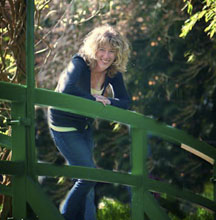ZAGREB AND THE ORIENT EXPRESS
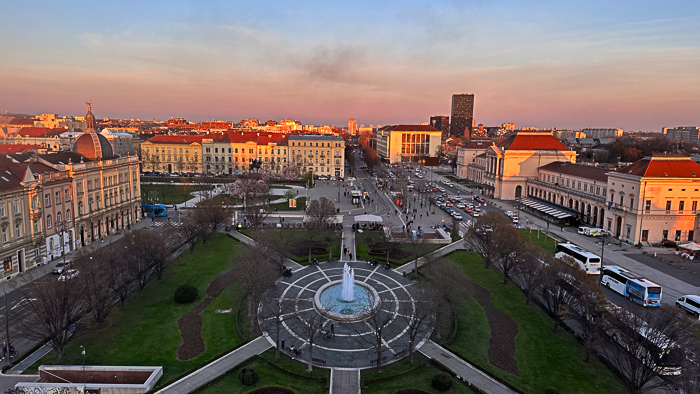
The train offered poor options for our two-plus hour transfer from Ljubljana to Zagreb so we took a utilitarian bus to this capital of Croatia. I still have gum in the treads of my shoes from the floor of the bus. We dragged our bags along a mile of busy sidewalk since we’d read of sketchy Zagrebian taxi drivers. We arrived sweaty and exhausted at our Hotel Esplanade where the doorman scurried out and relieved us of our suitcases without a word. The concierge pronounced our last name correctly, a first for us anywhere in Europe outside of England.
Investors built the Hotel Esplanade in 1925 to service one of the Orient Express train lines from Paris to Istanbul. You can get a bang for your euro here since it’s off today’s tourist radar. We checked in at this place once described as “where the Balkans end and civilization begins,” and laundered our dirty socks and underwear in the bathtub.
We booked the breakfast package and waitress Matea ordered me to order one of her favorites, the Nutella crepe. She told us she had two secrets with the hot breakfasts:
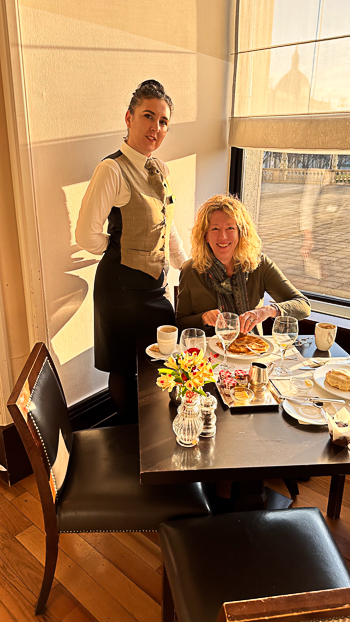
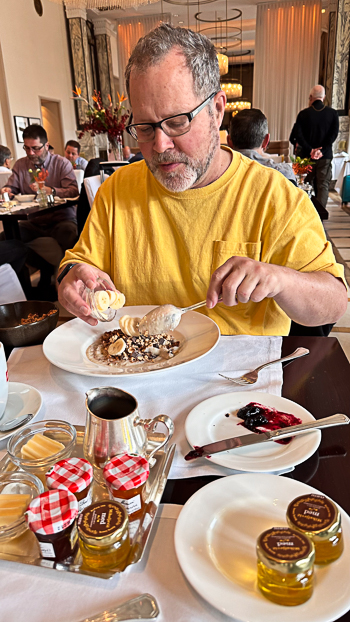
1. I needed to unfold my crepe and smear the Nutella and fresh berries around, roll it up like a cigar, then eat it like a hot dog. I felt silly amongst a bunch of international businessmen in this swanky dining room chomping on a chocolate crepe this way, but she wasn’t wrong.
2. Jim selected the oatmeal which Matea referred to as porridge. She informed Jim that his porridge was “boring” and required the addition of three specific ingredients. She delivered crunchy oat muesli, sliced bananas and honey for him. Once again, Matea wasn’t wrong.
I asked Matea if her modifications on these dishes sprung from some old Croatian culinary tradition. She laughed and said, no, they were just how she liked to eat them.
Jim put on his mustard-colored pants for breakfast this morning even though he says he loses items like his wallet and keys from the pockets because they are so shallow. “When I sit down, stuff pops out,” he explains. I asked why he still dressed in them and he said he “needed to wear colorful pants to breakfast: these are my breakfast pants.”
ZAGREB THE UNKNOWN
How can a modern, democratic city of over 800,000 that looks like Vienna remain so anonymous to most of the world? Even our very international Annie had never heard of Zagreb. This must frustrate the residents. They eagerly offer happy facts about their stylish city. “It’s safe to walk, even at night! You can drink our water straight from our pipes!” Most restaurants upsell their expensive bottled water, but as a matter of pride in Zagreb, they pimp their fine tap water instead.
QUIRKY MUSEUMS
We’d never experienced anything quite like Zagreb’s unexpectedly delightful Museum of Broken Relationships. People around the world send in their break-up stories along with a memento of their time together which the museum displays in funny and thoughtful ways.
At the ticket counter for the Museum of Naive Art, the curator spotted my Rick Steves book and pulled me aside. She informed me they were holding their current exhibit until May. She was very serious about this information, as if a matter of urgency. I said uh, okay.
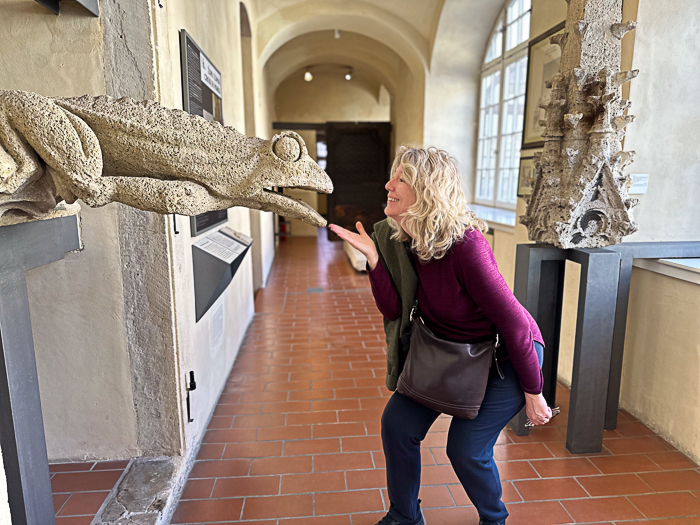
Five minutes later she approached again, handed me a second copy of their exhibit flyer and repeated their timeline. That’s great, I said. She then shadowed us down the hall before asking to photograph the front and back covers of my Rick Steves book.
I couldn’t figure out any of this, especially since Rick flatters the museum while making it clear that paintings get moved around and rotated regularly. It all felt awkward.
The museum probably doesn’t have Americans lining up to see Croatian naive art, but maybe if one of us stumbles in clutching a Rick Steves, they comment on the scarcity of pieces mentioned in his book? (Coincidently, a few days later a Rick Steves employee, Julie from Seattle, noticed me holding his guidebook in another museum. Julie was updating the next edition and wanted our feedback. We gave it.)
We felt more comfortable at the 1980s Museum which they really should just call “How Yugoslavs lived right before the fall of communism.” The museum recreated an apartment from that time period, one with a ton of western pop-culture influence. The result? A weird 1980s domestic mash-up of the Soviet Union and the United States.
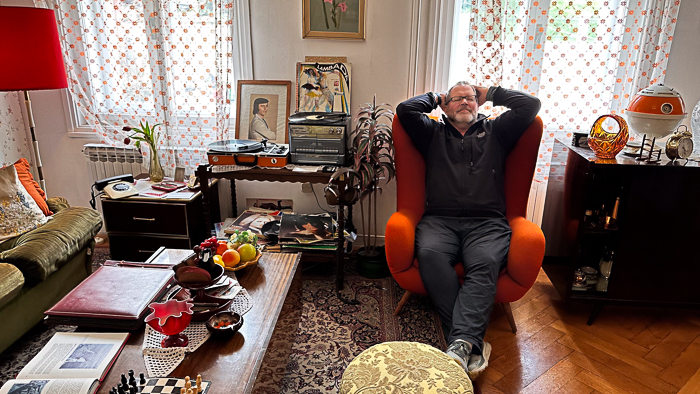
The 1980’s Museum had signs encouraging interaction, basically you can go ahead and touch stuff and sit on couches and play the Pac-Man, no worries. We had the place nearly to ourselves and took photos pretending we lived there, which wasn’t difficult since we still have a landline at home. Jim texted some shots to our kids captioned, “Our rental apartment in Zagreb.” They’ve yet to remark, but they’re used to us.
WE’RE IN EASTERN EUROPE, BABY
We know we can’t limit these peculiarities to Croatia, but we’ve noticed a few here:
1. When dealing with anything at our hotel, they request our room number, never our name.
2. If I order a decaf coffee, they serve either the nasty instant stuff or a quizzical look. I change courses. How about an Americano? I receive a shot of decaf espresso in a big cup. They don’t have cream, so I get to add a bunch of cold milk from the little pitcher but of course everything goes lukewarm. Both sides are too polite to remark on it.
3. As in Slovenia, we’ve observed that cars park along the sides of the streets facing both directions. You’ll find cars parked front to front and back to back all over the place, no problem.
4. At more than one hotel, the pillows come nearly as flat as my Nutella crepe. I double up with two. Once I accidentally grabbed Jim’s second pillow and luxuriated in a trifecta until he asked for it back.
5. The many Catholics actually attend Mass and their nuns strut the streets in their habits, holding court with random groups of school children like rock stars. I think practicing Catholicism feels a bit groovy and rebellious here since the Socialists banned it for nearly fifty years, a sort of post-Communist defiance of the faithful.
SOBERING HISTORY
We stumbled upon a Holocaust memorial at Zagreb’s railroad station near our hotel. In 1942, occupying Nazis forced 800 Zagreb Jews onto a train bound for Auschwitz at this very spot. We can see it from our room.
The city installed the memorial just two years ago—a reminder of the countless horrors suffered in this country from WWI and the Yugoslav Wars and everything in-between.
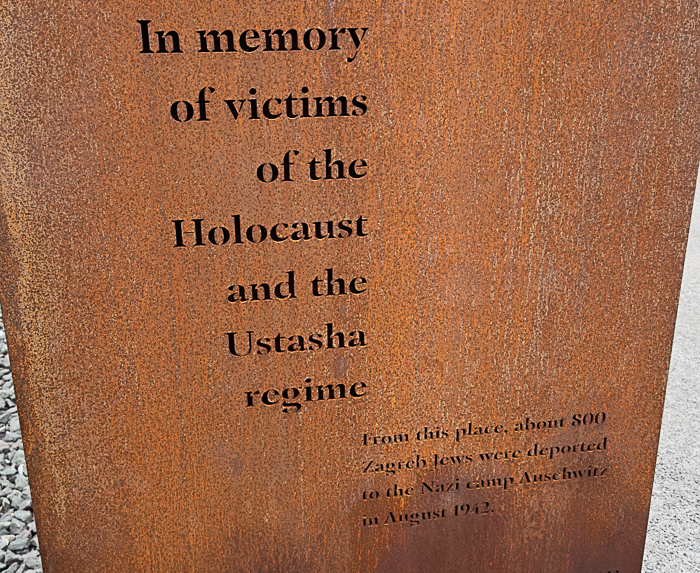
ONTO THE DALMATIAN COAST
We scored a chatty driver to Zagreb’s sleek airport, one more than happy to answer my questions about Croatian history and culture. He claims that both Zagreb and our Orient Express hotel get a lot of American tourists and once they visit, they return to stay in Croatia for an entire month. I assured him that Croatia enjoys a glowing reputation in the US but didn’t mention it mostly involved their beaches and that nobody’s heard of Zagreb.
Our driver told me that school children in Croatia learn English as their second language but before Independence they learned Russian. Croatia endured five years of war while Slovenia suffered two weeks; Croatia required a lot more recovery and catching up than Slovenia.
I asked what people think of former Dictator Tito these days. He described it as mixed and complicated. He himself isn’t a fan of the guy because after WWII, Tito slaughtered over 200,000 Yugoslav soldiers on the Nazi side. He pointed out that most of these soldiers had had no choice but to join the military.
Our driver said that Croatia fully adopted the Euro one year ago. People didn’t mind the change per se but were upset that costs spiked 30-40%, the result of three factors:
- Inflation just happened to occur at the time.
- People rounded-up pricing for convenience-sake.
- Merchants took advantage of the opportunity to bump up fees in the middle of all the confusion.
HOT SLAVIC TALK
Before we travel, I try to learn key words for the countries we visit. For example, “hello” is dober dan in Slovenia and dobar dan in Croatia. Both sound a whole lot like “Doberman.” So every time we greet someone, I think of guard dogs that reportedly make awesome family pets if trained properly.
We also like to correctly pronounce the cities we visit. Dubrovnik required some rehearsal ahead of time. Doo-BROVE-nick. I got Jim to practice. He says “Dubrovnik" in a bass voice with a thick roll of the R. He sounds like a studly Russian Olympic ice dancer. I make him repeat it all the time.
“THE PEARL OF THE ADRIATIC”
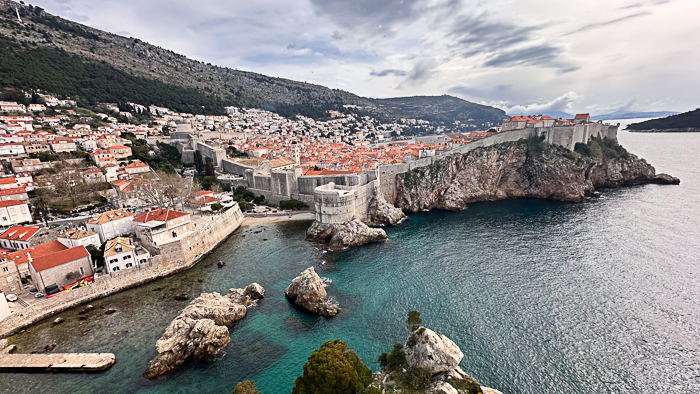
When you see travel posters of the Croatian coastline, you see Dubrovnik. The palm and orange trees and cafes overlooking the clear azure sea scream holiday, all in an impossibly medieval setting. Locals keep the city scrubbed clean and well-maintained. A cross between Venice and the Greek islands, Dubrovnik intoxicates even me, the teetotaler.
Dubrovnik delivers just the right level of buzz for us here in March— nicely quiet but not overly so, no crowds or lines, and ideal walking weather. High season starts at Easter and doesn’t let up until November, with June through September the peak.
Most tourists come from English and German-speaking countries. Italians and French gripe about the high costs, we hear, likely nostalgic for the deals of the not-so-distant past. Our waitress, Mikayla, made it a point to say that they like Americans.
THE SEIGE OF DUBROVNIK
I got to interrogate another airport driver, Tony, who contracts with our hotel. Tony wasn’t born until after the Yugoslav war but said his parents lived in Dubrovnik during it. When Yugoslav bombs dropped in 1991, residents in the old city huddled next to their 15th century walls. They had little water, electricity or communication during the city’s seven-month siege.
I asked Tony how they ate. He said the bakery made bread everyday which kept the people fed. Citizens also secured other food and supplies using small boats at night when the Yugoslavs couldn’t see so well.
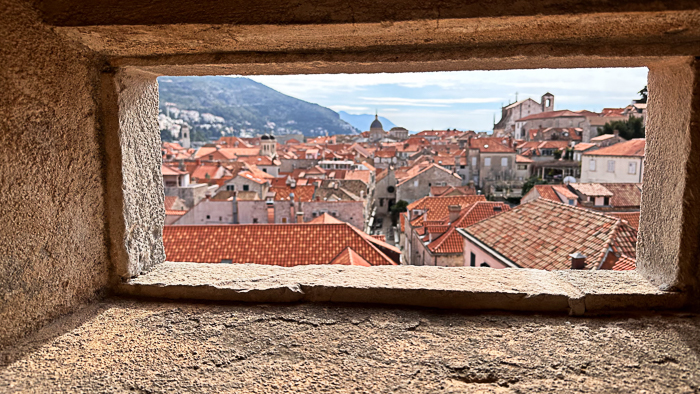
Later I asked Uber driver, Igor, about his experience as a 12-year-old boy during Dubrovnik’s siege. He said that everyone tried to continue normal life as much as possible and schools never closed. Neighbors left their doors unlocked in case someone needed to find a place to shelter during a bombing raid at any given moment.
Igor said that in some ways the siege was good as it brought out the very best in people. The community rose to the occasion and everyone was supportive, trusting, and unified with one another.
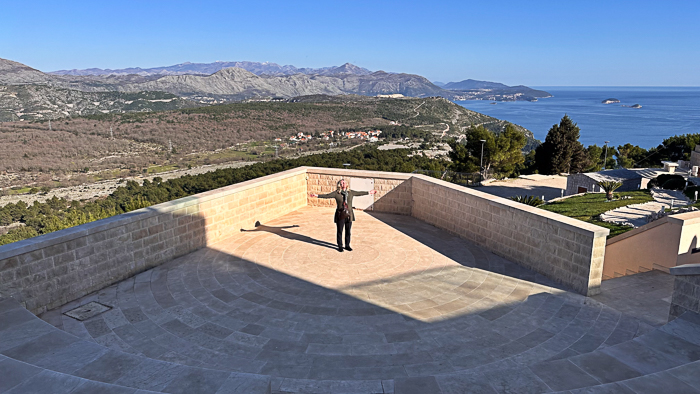
MODERN DUBROVNIK
During the pandemic, or “Corona,” as locals call it, Dubrovnik no longer had 10,000 cruise ship passengers visiting daily, and they liked it. They decided to restrict the daily cruisers to 5,000, which the ocean liners grumbled about, but they figured it out.
So many Dubrovniks have converted their apartments into short-term rentals that they now have a glut of them. The city hasn’t recovered to pre-Covid overnight numbers yet but they don’t seem concerned about it.
Dubrovnik served as a film location for The Game of Thrones and Star Wars which continues to draw rashes of visitors. I asked Igor if tourists had more interest in their history or in a good vacation. Igor laughed and said that they were most interested in Game of Thrones.
At the height of Game of Thrones, fans would sometimes recreate the famous Shame scene. They'd recruit friends to ring bells and scream “SHAME, SHAME, SHAME” while they descended the grand staircase of the Jesuit Church…naked.
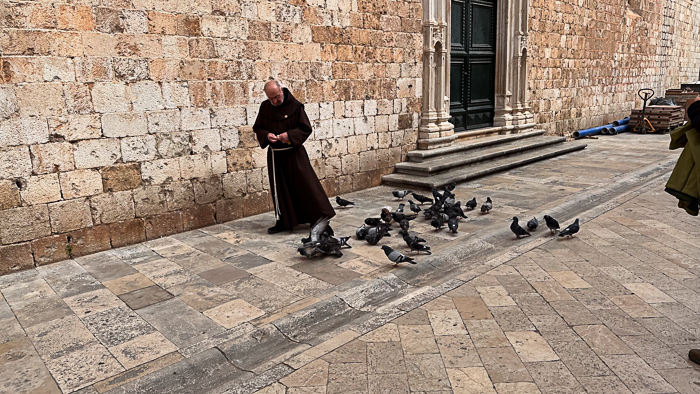
THE HUMANITY OF WAR
We have another layover in Amsterdam on our way home. Going off-season to Dubrovnik means four flights out of that city per day vs over forty in high-season. This also means a more complicated return back to Oregon for us, though well-worth it.
We have time to go to the Corrie ten Boom house in Haarlem. We visited a few years ago but I need to see it again. Last year I lost my high school Young Life and Bible study leader, Mary. I hosted a gathering of our old group and got to hear some new stories about her. One of them involved Corrie ten Boom.
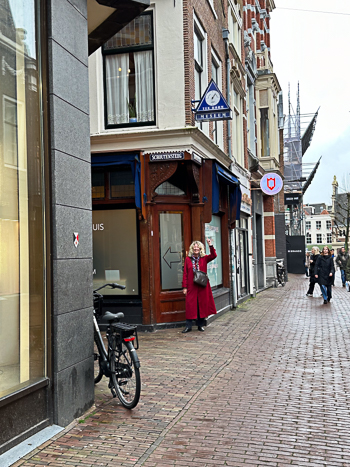
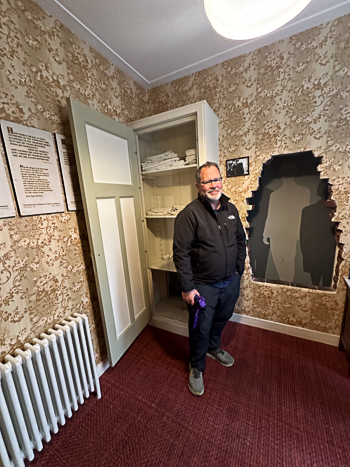
Back in the 1970s, Corrie came to Salem to speak. I got to attend but had not met Mary yet. Turns out Mary hosted Corrie at her home during her stay in Salem. One morning, Mary heard Corrie talking in her guest room, which concerned Mary since Corrie was alone. Mary later learned that Corrie was talking out loud to God.
I consider these war-torn places we just visited—the beauty of them, the horrors and atrocities the people experienced there. I won’t forget the bravery, humanity and resiliency of individuals in the midst of it all.
I’ll remember Ana Marija in a basement in Bled, protecting her children with her ax and whiskey disinfectant. I’ll think of the citizens of Dubrovnik leaving their doors unlocked so their neighbors could find immediate shelter during a bombing raid. And I’ll remember Corrie ten Boom risking her life to hide Jewish people in her bedroom wall.
And now, we go home.

